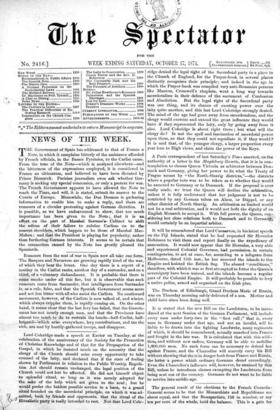Lord Coleridge made a speech at Exeter on Tuesday, at
the celebration of the anniversary of the Society for the Promotion of Christian Knowledge and of that fOr the Propagation of the Gospel, in which he insisted much on the necessity that the clergy of the Church should seize every opportunity to take -counsel of the laity, and declared that if the state of feeling shown by Parliament in relation to the Public Worship Regula- tion Act should remain unchanged, the legal position of the Church could not but be affected. He did not himself object to splendid ritual, so long as it was merely adopted for the sake of the help which art gives to the soul ; but he would prefer the baldest possible service in a barn, to a grand ritual founded on the sacerdotal principle, on which it was ad- mitted, both by friends and opponents, that the ritual of the Ritualistic party is really intended to rest. Not that Lord Cole-
ridge denied the legal right of the Sacerdotal party to a place in the Church of England, for the Prayer-book in several places distinctly recognises their principle ; and indeed in the age in which the Prayer-book was compiled very anti-Romanist persons like Manton, Cromwell's chaplain, went a long way towards sacerdotalism in their defence of the sacrament of Confession and Absolution. But the legal right of the Sacerdotal party was one thing, and its chance of exerting power over the laity quite another, and this last Lord Coleridge strongly denied. The mind of the age had gone away from sacerdotalism, and the clergy would exercise and extend the great influence they would have if they represented the laity, only by going away from it also. Lord Coleridge is about right there ; but what will the clergy do? Is not the spell and fascination of sacerdotal power upon them, so that they could not repudiate it, if they would? It is said that, of the younger clergy, a larger proportion every year lean to High views, and claim the power of the Keys.


































